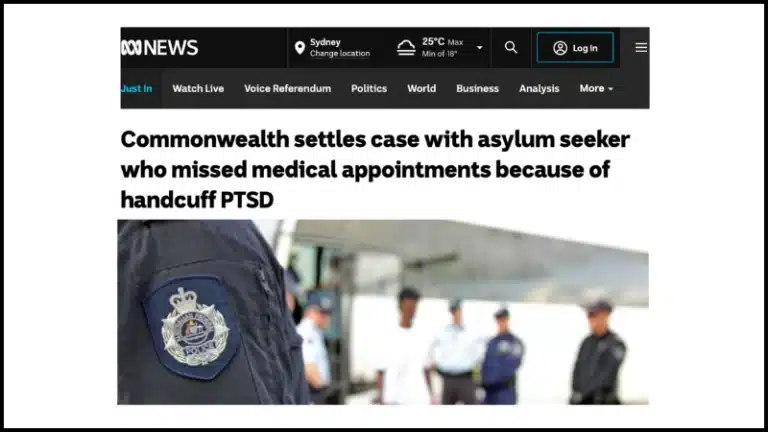The treatment of asylum-seekers and others who enter or remain in Australia without a valid visa attracts great controversy.
But some things should be uncontroversial.
Governments owe a duty of care to the people they detain. The state has a special responsibility to ensure any person it detains is treated fairly and humanely, and has access to essential services, including healthcare. And the standard of care that we provide for those whose liberty we deny should be the same standard we expect for our community.
Since 2016, the Public Interest Advocacy Centre’s Asylum Seeker Health Rights Project has been looking into the adequacy of health care in Australia’s immigration detention system. Our work has focused on concerns about the treatment of people in onshore immigration detention
What our work has shown is that successive Australian Governments have failed to provide adequate health care, with people in detention on the Australian mainland and Christmas Island missing out on the vital medical and mental health treatment they require.
Our report In Poor Health includes a number of case studies of clients we have been helping, including:
Marco*, who lives with chronic neck pain from an injury sustained in a suicide attempt but who has never received the surgery that has been recommended.
Hozan, who lives with PTSD and chronic stress due to abuse in the country from which he fled, but who is unnecessarily handcuffed when moving to and from medical appointments, leading to his re-traumatization.
Nadim, Anas and Bijan, who all lived with chronic hepatitis C and whose access to treatments which cure this potentially-fatal blood borne virus were either denied or unnecessarily delayed. Indeed, for Nadim and Anas, they only received treatment when PIAC had commenced or was about to commence litigation in the Federal Court.
The failure to provide hepatitis C treatment throws the issue into sharp relief.
Our government has pledged to eliminate hepatitis C by 2030. This is to be applauded. As of March 2016, new generation medications that provide a cure to hepatitis C have been available on the Pharmaceutical Benefits Scheme for all people over the age of 18 who have a medicare card. Prisoners have been identified as a priority population and the government has guaranteed the new medicines will be available to them.
This has not been the case for people in immigration detention. For a number of our clients, treatment has been withheld for years, contrary to clear and repeated medical recommendations. This delay increases the risk of liver cirrhosis, cancer and premature death. It is unconscionable.
The Australian National Audit Office and the Australian Human Rights Commission have both expressed serious concerns about the health and mental health services that are provided to people in immigration detention, following independent investigations.
Our courts have also expressed concern about the lack of legislative standards for the treatment of people in immigration detention, describing it as a ‘legislative vacuum’ that is ‘potentially unfair both to those involved in the conduct of detention centres and to the detainees’ and ‘not conducive to ordered and principled public administration’ (Finn J in Mastipour v Secretary, Department of Immigration & Multicultural & Indigenous Affairs).
This ‘legislative vacuum’ must be addressed as a matter of priority. In our report, we call for changes to the Migration Regulations to require a minimum standard of healthcare for detainees, modelled on similar provisions guaranteeing health care to prisoners in Victoria and the ACT.
This minimum standard will also need to be reflected in the contractual arrangements with immigration health care providers, as well as in policies and procedures, and training for the people delivering this care.
The system must also be subject to greater oversight, including by the Independent Health Advice Panel, and by the National Preventive Mechanism as Australia implements the Optional Protocol to the Convention against Torture.
These changes should not be controversial. They are long overdue and will help people like Marco, Hozan, Nadim, Anas and Bijan receive the vital health care that they need.
By Jonathon Hunyor, CEO, Public Interest Advocacy Centre.
*Pseudonyms have been used for all our case studies.


